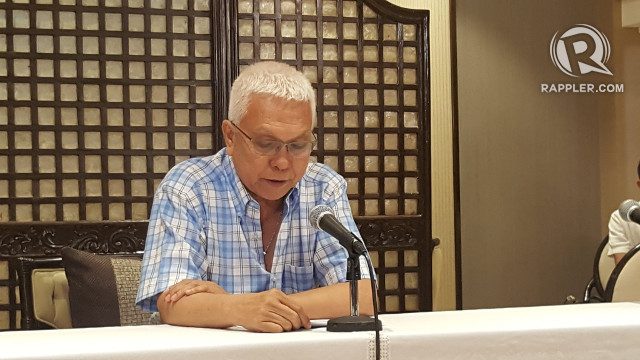SUMMARY
This is AI generated summarization, which may have errors. For context, always refer to the full article.

MANILA, Philippines (UPDATED) – The National Food Authority Council (NFAC) will use government-to-private rice importation this year when it activates its standby authority to import 250,000 metric tons (MT) of rice.
“It has decided to shift from the old government-to-government scheme to an open tender scheme, otherwise known as government-to-private scheme or G2P,” said Cabinet Secretary Leoncio Evasco Jr during a Tuesday, June 13, press conference in Malacañang.
Evasco serves as the chairman of the NFAC after President Rodrigo Duterte entrusted him with the NFA and 11 other government agencies.
The decision to shift to G2P for the importation of 250,000 MT of rice was reached during a June 9 special NFAC meeting.
G2P importation is when the government buys imported rice from private importers who use permits under the minimum access volume (MAV) scheme to import rice.
In the MAV scheme, the Philippines is required to import a minimum amount of rice – in this case, 250,000 MT – as part of its obligations to the World Trade Organization.
To protect the G2P system from corruption, Evasco said the NFAC also decided to introduce major changes in the way the scheme is implemented.
The following changes will be implemented for G2P importation:
- Imported rice should be delivered to Philippine ports in tranches. At least 30% of the volume of import quotas should arrive between August 2017 and September 2017 while the rest should arrive between December 2017 and February 2018.
- The NFA administrator must sign, within one day, import permits for private traders, upon the endorsement of the traders’ required documents by the NFA’s Grains Marketing Operations Division.
- Certificates of eligibility must be released in two days.
- The “schedule of activities” recommended by the Imports Committee should be adopted.
- Terms of payment to traders is shortened to 15 days from the original 365 days since small-time rice trade importers can’t wait an entire year before receiving payment.
- The NFAC will select and approve the members of the Bids and Awards Committee (BAC). Some members of the Council, including its farmer representative, will be able to observe BAC meetings.
- Subic Freeport Zone will no longer be used as port of entry for G2P rice imports. Instead, Zamboanga City’s port will be used. Evasco did not give a reason for this decision, but a source hinted that Subic Freeport Zone may have less safeguards against corrupt practices.
- Bidders will only be required to release the total cost of their bid. “Other expenses, such as cost of freight, logistics, and insurance will no longer be revealed since these details are considered as trade secrets,” said Evasco. Showing this information may also “give abusive traders and government officials an idea of which costs to pad or adjust,” he said.
- Suppliers with pending liabilities before 2017 will be allowed to bid. Provisions disqualifying them were taken out by the NFAC. “After all, they still enjoy the presumption of innocence,” said Evasco. But he emphasized that the NFA must still demand collection and file legal cases if it spots abuses.
- The NFA is ordered to come up with uniform Terms of Reference for all NFA regional BACs on cargo-handling for transportation of rice within the country.
Aquino on board
The safeguards were introduced to ensure transparency as the government shifts to G2P this year.
Evasco and the rest of the NFAC prefer G2P because this mode of importation can be scrutinized using the Government Procurement Act.
But NFA Administrator Jason Aquino had pushed for G2G, or the purchase of rice from foreign governments. Aquino believed the G2P could be easily abused by rice cartels.
Evasco’s camp however, said that a new law, Republic Act 10845, introduced strict safeguards against unscrupulous private importers. This law declares agricultural smuggling economic sabotage.
Evasco called for Aquino’s dismissal for insubordination and his push for G2G despite the NFAC’s decisions against it.
The Cabinet Secretary and other NFAC members argued that G2G will only lead to more government debt since taking out a loan is required to pursue it. G2G is also exempted from the Government Procurement Act, making it less transparent and thus prone to abuse. (READ: Dismissed Usec Valdez to Duterte: Probe ‘NFA syndicate’)
But it seems Aquino is now going along with the NFAC decision to shift to G2P. He attended the June 9 meeting and has so far not raised any objections. As NFA administrator, he is tasked to implement the decisions made by the NFAC.
Amid the rift between Evasco and Aquino, the President fired Evasco’s undersecretary Halmen Valdez who was pushing for G2P.
Duterte had insisted that Valdez was acting against the best interests of local farmers by pushing for rice importation. But Evasco said the need to import rice was explained to Duterte during a Cabinet meeting. – Rappler.com
Add a comment
How does this make you feel?
There are no comments yet. Add your comment to start the conversation.